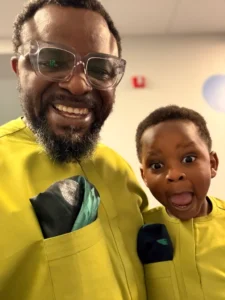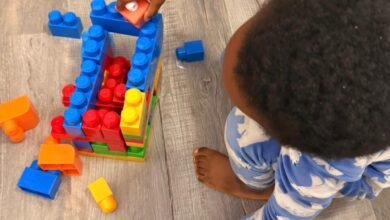They Grow Very Fast, So Do We

Since the birth of our son, I’ve often heard the phrase, “They grow so fast,” especially when I share stories or milestones about him online. It’s usually said with a mix of awe and nostalgia, reflection on the fleeting nature of childhood.
But as a man in my mid-50s raising a 3½-year-old, my first child, that phrase lands differently. It doesn’t just describe him. It describes me too.
We are both growing, he, into the world; I, in many ways, out of it.
He is in his formative years. I am in what some might call my twilight years.
Let me be clear: I believe in longevity, and I actively live by principles that support health and vitality. But as Psalm 31:15 reminds us:
“My times are in Your hands, O Lord.”
Longevity is subject to God’s sovereignty.
This realization fills my parenting with urgency, not panic, but purposeful awareness.
My son doesn’t have time to waste because these early years are decisive. Research and experience agree: by age six, much of a child’s personality and worldview are already formed.
And I don’t have time to waste either, not on experiments, not on trial-and-error parenting. I must pour all of myself, my values, my time, my energy, into him, preparing him, under God, for the life ahead.
Authority, Not Dominion
I’ve come to understand that I have authority over my child, but not dominion.
Authority is not about control or coercion. It is not dominance.
True authority is the sacred responsibility to communicate values, by example, while preserving the dignity of the child as a person created in the image of God (Genesis 1:27).
Authority exercised without respect becomes oppression. It may look like discipline, but it strips the child of their dignity, and dignity lost in childhood can echo painfully throughout life.
When dignity is eroded, values cannot take root.
Because values begin with a recognition of the dignity of the human person.
We cannot claim to be communicating values while demeaning the very person we’re guiding.
Authority must build, not break. It must protect the emotional and psychological space in which values are not only taught, but also received and lived out.
Without this foundation, the values we attempt to instill may be rejected or distorted, and the child may lack the emotional strength, or what I call a dignity quotient, to live them out.
Whether we misuse our authority, remain silent, or abuse it under the guise of “discipline,” we risk losing far more than we realize.
This is why I teach that discipline must become a culture, not a punishment or a reaction, but a consistent way of life that enables the child to grow with a strong sense of identity and worth.
The Orphaning of the Present Child
I once said:
“Orphans are not just those without parents. They are children whose parents are not present to inculcate values.”
It is not merely our lifespan that matters, it is our life impact.
The values we model and pass down, those eternal truths, will outlive us and carry our children farther than our hands ever could.
Time Is Not on Our Side
As I reflect on my own journey:
- At 6, I began primary school.
- At 13, I entered secondary school.
- At 18, I finished.
- At 20, I entered university.
- At 27, I graduated.
- At 29, I was called to the Bar.
- At 30, I built my first bridge.
- At 40, life felt like it was just beginning.
- Now at 55, I realize…
I grew fast.
And I’m still growing, aging, fast.
So when we say, “They grow fast,” we must remember:
We do too.
The urgency of parenting lies not only in the fleeting nature of childhood, but in the sobering truth that our window to shape it is limited.
Jesus said in John 9:4:
“I must work the works of Him who sent Me while it is day; the night is coming when no one can work.”
This is our day, our window.
The values we fail to plant now may never be planted.
The dignity we fail to affirm now may never be restored.
The truth we fail to live now may never be learned.
Let us not assume we have time.
Proverbs 22:6 reminds us:
“Train up a child in the way he should go, and when he is old, he will not depart from it.”
That gives me hope.
That keeps me sober.
That keeps me present.
Final Thoughts
They grow very fast. So do we.
Let us not waste the moment.
 Thank you for reading. I hope this reflection stirs your heart and sharpens your focus. Let us raise children, not just to grow, but to thrive. With purpose, with dignity, and with grace.
Thank you for reading. I hope this reflection stirs your heart and sharpens your focus. Let us raise children, not just to grow, but to thrive. With purpose, with dignity, and with grace.





